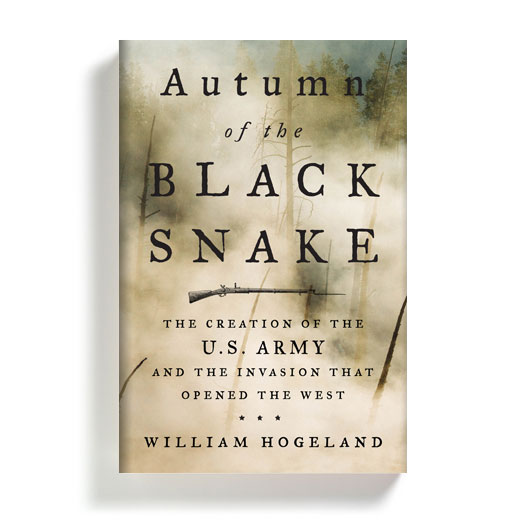In 1791, a brilliantly organized confederation of Shawnee, Miami, and Delaware Indians devastated a band of American militiamen in the backwoods of what is now northwestern Ohio. With nearly one thousand U.S. casualties, this was the worst defeat the United States would ever suffer at native hands. Americans were shocked—perhaps no one more so than their commander in chief George Washington, who saw in the debacle an urgent lesson: the United States needed an army. In Autumn of the Black Snake, historian William Hogeland tells the overlooked but crucial story of how Washington achieved his aim.
George Washington was famous for controlling his emotions. In early December 1791, however, at the close of a wintry Philadelphia day, the president received news that caused him to give way to explosive feeling.
It was a Friday evening, and he was at dinner with other gentlemen in his rented mansion, a building officially known as the President’s House. A uniformed officer rode up to the door, dismounted, handed his bridle to a servant, and knocked, arousing a porter. The porter told him the president was at dinner. The officer insisted he had important dispatches, so the porter sent a servant into the dining room.
Among the company at the table was Tobias Lear, Washington’s personal secretary. Lear excused himself, went to the entry hall, and asked the officer to hand over the dispatches. The officer refused. He was an officer of the western army, he said, under orders to deliver these dispatches directly to the president, in person, and with no loss of time.
Lear went back to the dining room and whispered to the president. Washington left the room but returned quickly, apologized, and rejoined the conversation. The evening went on. The gentlemen joined the ladies in Mrs. Washington’s drawing room, as usual, and as usual the president made sure to speak politely to each lady in the room. By ten, as usual, the guests had left. Only Lear and Mrs. Washington remained in the drawing room. Then, as usual, Mrs. Washington went to bed.
“To suffer that army to be cut to pieces, hacked, butchered, tomahawked—by a surprise! The very thing I guarded him against!”
The president slowly paced the room in silence. Then he sat on a sofa by the fire. He told Lear to sit as well. At last he broke the silence.
“It’s all over,” Washington said. “St. Clair’s defeated—routed. The officers nearly all killed, the men by wholesale, the rout complete—too shocking to think of, and a surprise into the bargain.” He meant the Indians had managed to ambush St. Clair.
He rose. Lear rose. Washington resumed walking around the room, around and around and around. Near the door, he stopped short.
“Yes!” he shouted. “Here on this very spot I took leave of him! I wished him success and honor! ‘You have your instructions,’ I said, ‘from the Secretary of War, I had a strict eye to them, and will add but one word: Beware of a surprise! I repeat it: Beware of a surprise! You know how the Indians fight us.’ He went off, with that as my last solemn warning thrown into his ears, and yet!” Washington was shaking all over, throwing his arms up again and again in paroxysms. “To suffer that army to be cut to pieces, hacked, butchered, tomahawked—by a surprise! The very thing I guarded him against!
“Oh God, Oh God, he’s worse than a murderer!” the president shouted. “How can he answer it to his country! The blood of the slain is upon him! The curse of widows and orphans! The curse of Heaven!”
He threw himself into a sitting position on the couch and fell silent. After a while, he spoke in normal tones.
“This must not go beyond this room,” Washington told Lear.
• • •
That’s what a man named Richard Rush said Lear told him. Rush had the story shortly before Lear’s death; another version, told by George Washington Custis, the president’s step-grandson and adopted son, circulated too, and Custis said he had it directly from Lear. There were only a few discrepancies in the two versions, and the point of the story, for both Rush and Custis, wasn’t Washington’s startling loss of control but the amazing self-possession that the great man always managed to maintain in the face of infuriating frustration. On hearing of the calamity, Washington got through dinner and the after-dinner hour without betraying even a hint of what overwhelmed him; half an hour after the outburst, he’d regained perfect calm. It was as if the moment in which he’d called down the curse of God on St. Clair’s head never happened.
Mastery of emotion is one way to read the story. Loss of mastery is what made it worth telling. Washington could be brusque; he could be icy and even petulant. But the president had never before exposed such distress with anything like such violence. He never would again.
Beware a surprise. Calling down curses, Washington caused surprise, certainly to Tobias Lear, possibly more decisively to himself. The moment when Washington dropped his mask stayed with Lear until the end.
William Hogeland is the author of three books on founding U.S. history—The Whiskey Rebellion, Declaration, and Founding Finance—as well as a collection of essays, Inventing American History. Born in Virginia and raised in Brooklyn, he lives in New York City.

